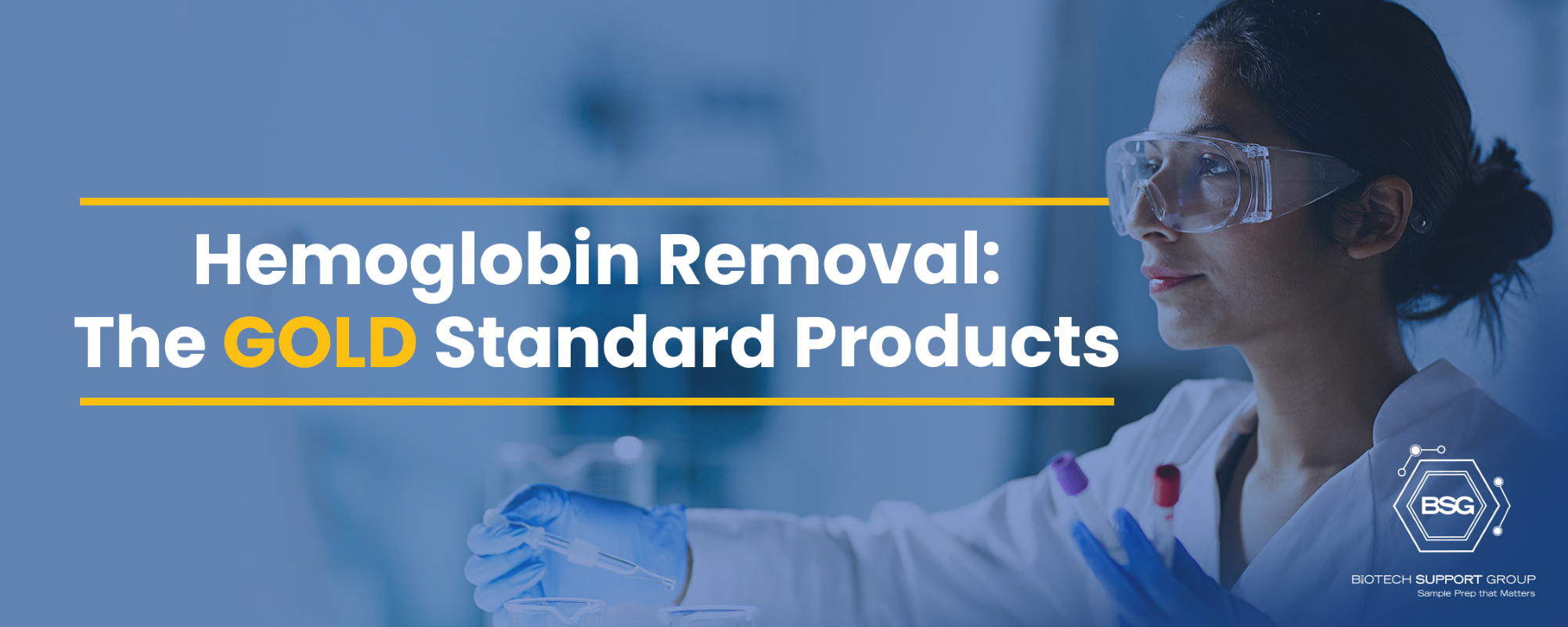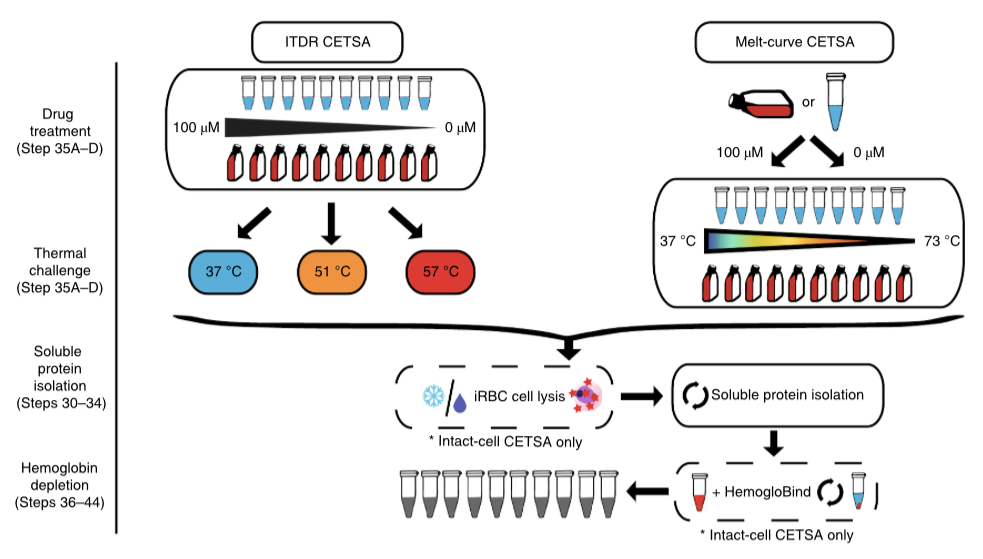|
Nature Protocols Article Cites HemogloBindTM in Drug Target Identification Methods for Malaria-parasite Infected Erythrocytes Biotech Support Group reports on a research article published in Nature Protocols, describing the simplicity and efficiency of their hemoglobin depletion technology to survey the red cell proteome, to identify drug-target interactions in Malaria-parasite News
Release Nature
Protocols Article Cites HemogloBindTM
in Drug Target Identification Methods for Malaria-parasite Infected
Erythrocytes MONMOUTH
JUNCTION, NJ, April 30, 2020 -- Biotech Support Group reports on a
research article published in Nature Protocols, describing the
simplicity and efficiency of their hemoglobin depletion technology to
survey the red cell proteome, to identify drug-target interactions in
Malaria-parasite infected erythrocytes. The citation is: Dziekan, Jerzy Michal, et al. "Cellular thermal shift assay for the identification of drug–target interactions in the Plasmodium falciparum proteome." Nature Protocols (2020): 1-41. The
authors describe how little is known about the cellular targets and
the mode of action of the vast majority of antimalarial drugs. The
cellular thermal shift assay (CETSA) protocol presents a
comprehensive strategy for the identification of drug targets. CETSA
enables proteome-wide target screening for unmodified antimalarial
compounds with undetermined mechanisms of action, providing
quantitative evidence about direct drug–protein
interactions. The experimental workflow involves treatment of P.
falciparum–infected
erythrocytes with a compound of interest, heat exposure to denature
proteins, soluble protein isolation, enzymatic digestion, peptide
labeling with tandem mass tags, offline fractionation, and liquid
chromatography–tandem
mass spectrometry
(LC-MS)
analysis. The
protocols present workflows for parasitized cell enrichment and
hemoglobin depletion strategies for both lysate and intact-cell
sample preparation, that are compatible with the CETSA assay and
provide satisfactory coverage of both parasite and RBC proteomes from
the digested peptide analyses.
“I am very pleased to see that our product - HemogloBindTM was an enabling technology in this drug target identification workflow. While the article focused on use for malaria drugs, the discussion describes how the workflow can be generally applied for investigating red cell susceptibility to many stressors at the proteome level. For COVID-19 research, this could include the reduced capacity for red cells to exchange oxygen or the various stressors imposed by the inflammatory response to the virus. Through the adoption of these methods, we hope this will lead to new drugs for many diseases”, states Swapan Roy, Ph.D., President and Founder of Biotech Support Group.
For more information on HemogloBind™, visit: https://www.biotechsupportgroup.com/HemogloBind-Hemoglobin-Depletion-From-Hemolyzed-p/h0145.htm
Converging with cultural and technological disruptions forthcoming in healthcare, Biotech Support Group develops methods for cost effective and efficient sample prep essential for these expanding markets. Following a tiered business strategy, the company continues its growth in the consumable research products area supporting the rapidly expanding installation of LC-MS instrument and computational infrastructure. For this market, key products include: AlbuVoid™ and AlbuSorb™ for albumin depletion, Cleanascite™ for lipid adsorption, and HemogloBind™ and HemoVoid™ for hemoglobin removal. From these innovations, the company has acquired knowledgebase and biomarker intellectual property assets that support discoveries of protein markers from blood, with special emphasis on early detection and personalized medical decisions for cancer patients. For more information, go to http://www.biotechsupportgroup.com
|

- About
- Products
- Hemoglobin Removal Kits
- Lipid Removal & Clarification
- Urine Protein & Low Abundance Enrichment
- Class Specific Enrichment
- Sample Prep Mass Spectrometry
- Functional & Chemical Proteomics
- Genomic Sample Prep
- Accessories
- Technical Resources
- References
- Publications & Reports
- FAQs
- Case Studies
- Cleanascite™ Unlocks Insights into Lipid-Driven Tumor Immunosuppression
- NRicher™ Bead Platform Provides Unique Sub-Proteome Biases And Fit For Purpose Opportunities for Targeted LC-MS Quantification
- BSG Products To Assist in Analyzing Macrophage Polarization
- Ectodomain Shedding and Enrichment of the Soluble Membrane Proteome
- Investigate out of the Venn Diagram box
- Methods to selectively deplete or purify Hemoglobin from Dried Blood Spots (DBS)
- The Utility of HemoVoid™ is Demonstrated in 3 Proteomic Investigations Identifying Potential Disease Specific Biomarkers
- The 4 common features of our sample prep products, known as the BSG Advantage, are highlighted in a selection of journal references.
- AlbuVoid™ Workflows Advance Cell Secretome Proteomics
- Lipid Removal for Phenotypic Cell Response in Cancer Research
- The Influence of Sample Prep Bias on LC-MS Targeted Peptide Quantification in Serum Proteomics
- Re-imagining proteomics for developing precision medicine biomarkers of the innate immune response in SARS-CoV-2
- Patent Application Describes New Proteomic Methods to Monitor Protease Inhibitor Function During Covid-19 Infections
- Efficient Hemoglobin Removal Advances Red Cell Proteomics Offering Many New Insights Into Inflammation and Infectious Disease
- The Potential for New Blood Biomarkers in the Management of COVID-19 Disease
- Establishing the Utility of HemoVoid™ and HemogloBind™ as Enrichment Tools for Proteomic Analysis of Red Cells and Whole Blood in Parkinson’s Disease
- Species Diversity Supported By BSG Products
- Poster Report Describes Loss of Functional Serpin Activity In Cancer Patient Blood
- AlbuVoid™️ PLUS & AlbuSorb™️ PLUS Evaluating Different Windows of Observation Solves The Many Challenges of Serum Proteomics
- Tackling the Challenges of Serum Proteomics
- Lipid Removal Sample Prep for Cell Response Applications
- Sample Prep for Proteomic Analysis of Saliva
- Biotech Support Group Featured in Book, "Functional Proteomics – Methods and Protocols"
- Sample Prep Liquid Biopsy Products Suitable for Proteomic Profiling of a Variety of Body Fluid Sample Types
- Albumin and High Abundance Depletion
- Using HemogloBind™ as a Hemoglobin Binding Reagent
- Diverse technologies available for researchers to selectively bind or enrich exosomes and extracellular vesicles.
- Stroma Liquid Biopsy™ Biomarkers Profile Pan-Cancer Dysregulation of the Serum Proteome
- Diverse Depletion and Enrichment Technologies Enhance Simplicity and Efficiency of Obtaining Quality Proteomic Information
- Use On-Bead Digestion to Improve Time Required for Serum Digestion
- Using AlbuVoid™ as a Serum Protein Enrichment Kit in Functional Proteomics
- Using Cleanascite™ as a Lipid Absorption and Clarification Reagent
- Using HemoVoid to Remove Hemoglobin Before Analysis
- Blog
- Contact
- Liquid Biopsy

